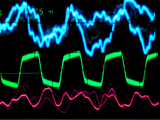IMDEA Networks

Keynote: Challenges and Solutions for Millimeter-Wave Wireless Networks

Joerg Widmer, Research Professor, IMDEA Networks Institute, Madrid, Spain
External Presentation (IN Speaker)
One of the most promising options to significantly increase data rates in future wireless networks is to vastly increase the communication bandwidth. Such very high bandwidth channels are only available in the extremely high frequency part of the radio spectrum, the millimeter wave band (mm-wave). Upcoming communication technologies, for example IEEE 802.11ad, are already starting to exploit this part of the radio spectrum to achieve data rates of several GBit/s. mm-wave communication is also discussed as key technology for 5G mobile networks. However, communication at such high frequencies also suffers from high attenuation and signal absorption, often restricting communication to line-of-sight scenarios and requiring the use of highly directional antennas. This in turn requires a radical rethinking of wireless network design. On the one hand side, such channels experience little interference, allowing for a high degree of spatial reuse and potentially simpler MAC and interference management mechanisms. On the other hand, such an environment is extremely dynamic and channels may appear and disappear over very short time intervals, in particular for mobile devices. It is essential to take these characteristics into account to design efficient wireless architectures. The talk will highlight main challenges and possible solutions for networking in the mm-wave band.
About Joerg Widmer
Joerg Widmer is Research Professor at IMDEA Networks Institute in Madrid, Spain. He received his M.S. and PhD degrees in computer science from the University of Mannheim, Germany, Germany in 2000 and 2003, respectively. His research focuses primarily on wireless networks, ranging from MAC layer design and interference management to mobile network architectures. From 2005 to 2010, he was manager of the Ubiquitous Networking Research Group at DOCOMO Euro-Labs in Munich, Germany, leading several projects in the area of mobile and cellular networks. Before, he worked as post-doctoral researcher at EPFL, Switzerland on ultra-wide band communication and network coding. He was a visiting researcher at the International Computer Science Institute in Berkeley, CA, USA and University College London, UK. Joerg Widmer authored more than 100 conference and journal papers and three IETF RFCs, holds several patents, serves on the editorial board of IEEE Transactions on Communications, and regularly participates in program committees of several major conferences. Recently, he was awarded an ERC consolidator grant as well as a Spanish Ramon y Cajal grant. He is senior member of IEEE and ACM.
More info:

